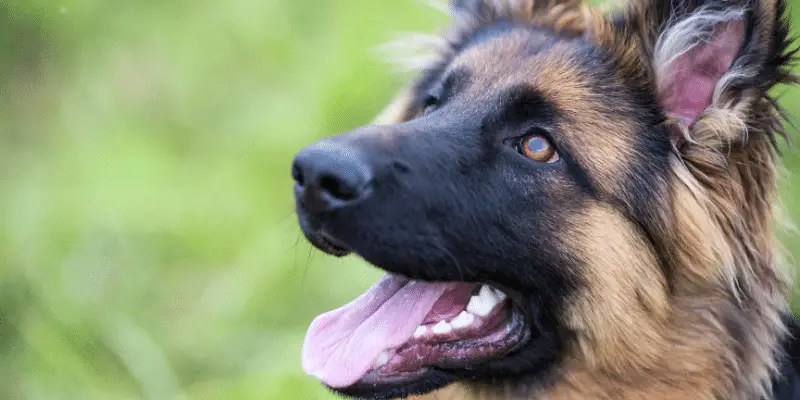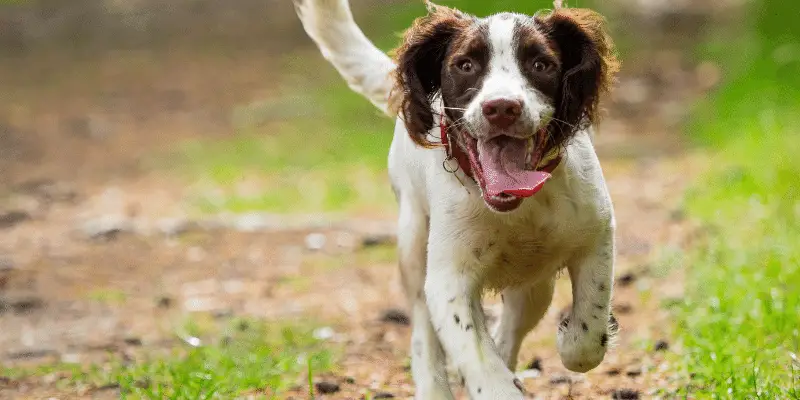Health and Care
Now that puppy vaccines are completed, your puppy will not need to see the veterinarian until adulthood (unless something is wrong). Be sure to watch your puppy for any signs of illness. Contact your vet with any concerns. You are still learning what is normal for your puppy. It is much easier to treat most health issues if they are caught early.
:max_bytes(150000):strip_icc()/stages-of-puppy-development-2804675_final-f8d50bfd998842c8969f1ccf0f918dd2.png)
Food and Nutrition
Proper nutrition is an important part of your puppys development. In general, you should continue feeding puppy food (dog food labeled for growth) until your puppy is done growing. Large breed dogs often need to stay on puppy food past their first year, but other dogs can usually start to transition to adult food between 9 and 12 months of age. Small breed dogs may transition even earlier.
Because your dogs rate of growth is slowing at this time, it can be easy to accidentally overfeed. Make sure your dogs growth is overall, not just in his belly. Obesity in dogs is a common problem. Ask your vet for advice about your dogs optimum weight. Your vet can also tell you when to transition your dog to adult food.
When feeding treats, make sure they are non-toxic, healthy, and not fed in excess. Dog treats should never make up more than 10 percent of your puppys daily food intake.
When giving chew treats, avoid bones, antlers, hooves, hard nylon dog toys, or other hard chews. Even though the adult teeth are all in, they can easily be damaged by chews that are too hard.
You are never truly done training your puppy. Even adult dogs need regular training to keep them sharp. By this time, house training should be basically complete. Now is a good time to fine-tune obedience training. Continue to practice basic commands like sit, stay, and down. Add more advanced things, like roll over. Keep working on the recall cue and add in an emergency recall.
As your puppy matures, you may notice new behavior problems cropping up. Address them as soon as possible. Dont assume your puppy will grow out of it. The longer you allow inappropriate behavior, the more difficult it will be to correct it. If the issues are too hard to manage on your own, seek assistance from a dog trainer or behaviorist.
6 Puppy Development – What to Expect
It seems like only yesterday you were bringing your tiny puppy home for the first time. But at 6 months old, your pooch is now considered an adolescent.
They’re in the final stretch of their development stage, and pretty soon you’ll have an adult dog on your hands. The care needs of a 6-month to 1-year-old pooch are drastically different from earlier ages, which we’ve also covered, so you’ll need to make sure you’re prepared.
And to help you on your way to raising a healthy and happy adult dog, we’ll be going over everything you need to know about month 6 to 1 year of puppy development.
By now, your puppy should be on a consistent schedule so they know what to expect each day. But if you hadn’t got a routine planned out for your pup just yet, here’s an example one you could use below.
| Time of day | Activity |
|---|---|
| 7am | Potty break and activity. |
| 8am | Meal/drink and activity |
| 9am | Sleep |
| 12pm | Potty break and activity |
| 4pm | Sleep. |
| 6pm | Potty break, meal and activity. |
| 8pm | Activity until bedtime. |
| 10pm | Potty break and bed. |


“The hottest question on the lips of most 6 month old puppy owners is ‘When do they need to get neutered?’ Most vets are moving away from neutering pet dogs at a young age, especially when it comes to larger breeds and anxious dogs.
Oftentimes, we’ll want a dog to be fully developed (both physically and mentally) before neutering them, which can mean waiting another year or so after they reach 6 months of age” – Dr Linda Simon MVB MRCVS
By 6 months of age, your puppy should hopefully be crate trained and housebroken. Some pups might have the odd accident or two, but this shouldn’t be a regular occurrence.
Your puppy’s brain is fully developed at this point, so they should understand the difference between wrong and right behaviour.
Now is a good time to work on some basic commands such as sit, stay, and lay down. You can also start adding some tricks like roll over, crawl, and catch.
If you haven’t already, consider teaching your puppy recall (i.e., come back when called). This is handy during off-leash walks for when you need your pooch to return to you. Teaching your dog to drop items on cue is also important, particularly if they get their paws onto something they’re not supposed to.
Once your puppy has learned everything they need to know, you should continue training sessions to keep them on their toes. Otherwise, you might find your puppy has a sudden case of forgetfulness, which might set their training process back.
Around this time, you might notice your puppy picking up some bad habits or new behavioural issues. Make sure you rectify any problem behaviour as soon as possible.
Don’t be tempted to let it slide or presume it will go away once your dog reaches adulthood. The longer you leave it, the harder it will be to correct.
If you’re struggling to deal with a misbehaving puppy, speak to your vet for advice or consult a dog trainer.

Your puppy is essentially a teenager at 6 months old, and their behaviour will be a lot different to when they were 8 weeks or even 16 weeks old. They will likely be energetic, playful, and much more independent.
It’s also common for puppies to get a bit rebellious and destructive during this stage of development. They may start regressing in terms of training, seemingly “forgetting” all the things you’ve previously taught them.
Try not to get disheartened and continue working on your pup’s training. Be consistent and repetitive with sessions, and above all else, don’t lose hope! Your puppy’s naughtiness isn’t personal, it’s just something that happens during the adolescent stage.
You can help reduce mischievous behaviour by ensuring you provide your dog with plenty of physical and mental stimulation. Puzzle toys, games of fetch or tug-of-war, and even agility courses are great ways for curbing boredom in rascal pups.
In addition to a newfound rebellious streak, you might notice a shift in the behaviour between your puppy and other dogs in your house. Adult dogs will know your pup isn’t so young anymore. They’ll be less likely to look the other way if your puppy crosses any boundaries.
